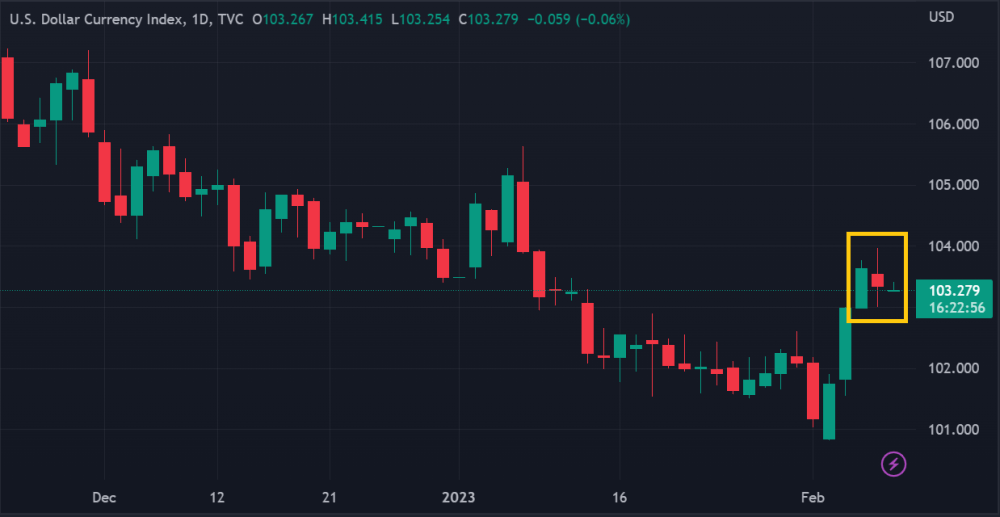The Fed Chair, Jerome Powell, only repeated his old rhetoric, causing the rally in US Treasury yields and the US dollar to slacken while waiting for the next catalyst.
The US Dollar Index (DXY) yesterday failed to break through the 104.00 threshold, then slammed after the circulation of the latest comments from the Chair of the Fed, Jerome Powell. Its position had retreated to around 103.28 at the end of the Asian session on Wednesday, February 8. Accordingly, the greenback has been performing mixedly across major currency pairs.

In a question-and-answer session before the Economic Club event in Washington yesterday, Powell acknowledged that interest rates may need to rise higher than expected if US economic conditions remain strong. However, he emphasized again that the disinflation process had already begun.
"The process of disinflation, the process of bringing inflation down, has started, and it's starting in the goods sector, which makes up about a quarter of our economy," Powell said.
"We hope that 2023 will be a year of significant inflation reduction. It is actually our job to ensure that it happens. My guess is that the disinflation process is not only this year, but it will take until next year for (inflation) to fall to close to 2%."
According to Powell, his party will continue to make decisions according to the latest data. He did not mention a specific timeline for how long the interest rate hike cycle would last in order to achieve the inflation target.
"The reality is we will react to the data," Powell continued, "so if we continue to get, for example, strong labor market reports or higher inflation reports, we may have to do more and raise interest rates more than previously thought."
None of this is new news, but merely a reaffirmation of things Powell has disclosed in various previous public communications. As a result, the rally in US Treasury yields and the US dollar both relaxed while waiting for the next catalyst.
"Powell didn't say anything really new. I think we're pretty used to the idea that the Fed is data dependent right now," said Chris Weston, head of research at Pepperstone, "and markets and central banks are now in a position where they are just eyeing the data, so we are now less sensitive to the rhetoric of Fed officials and much more data sensitive."
The schedule for releasing economic data from Uncle Sam's country tends to have a low-medium impact this week. Several big news items will be published next week, namely consumer inflation data, retail sales data, and producer inflation data.

 Dedicated FREE FOREX VPS
Dedicated FREE FOREX VPS Free FOREX Virtual Private Server
Free FOREX Virtual Private Server MT4 Demo Contest, Get $500
MT4 Demo Contest, Get $500 Sign Up for an Account, Claim 60% Deposit Bonus
Sign Up for an Account, Claim 60% Deposit Bonus Free MT4/MT5 VPS 2024
Free MT4/MT5 VPS 2024 Send E-mail and Get Free Merchandise
Send E-mail and Get Free Merchandise $1K Refer a Friend Bonus for Pepperstone Pro clients
$1K Refer a Friend Bonus for Pepperstone Pro clients Maximize Your Earnings with 100% Deposit bonus
Maximize Your Earnings with 100% Deposit bonus Trade to Win, $5,000 Monthly Demo Contest
Trade to Win, $5,000 Monthly Demo Contest Claim 30% + 15% Deposit Bonus from LiteFinance
Claim 30% + 15% Deposit Bonus from LiteFinance






